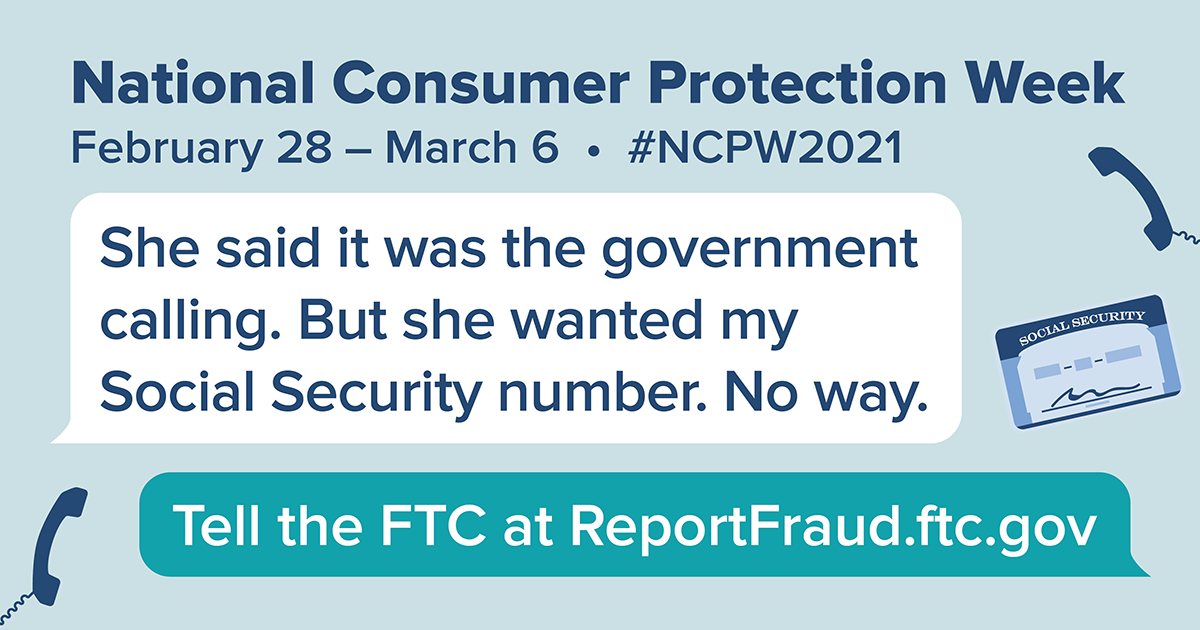Lots of people are having trouble sleeping, thanks to the pandemic and all the parts of our lives it’s affecting. And it doesn’t help when you get a call saying you owe the government money. Oh, and, they add, you’ll go to jail if you don’t pay up immediately. That’s a scam, and nothing to lose sleep over. For those who are a little more cut off from people than usual, these calls might feel more real and worrying than they are. If you know someone might be cut off from others right now, reach out to them to make sure they know these calls are scams.
Here are some things you might share with them about government imposters.
First, plenty of people have spotted calls, texts, and emails from bogus government officials. In 2020, people reported losing more than $174 million to government imposter scams, with a median loss of $1,250.
Second, you can share a few ways to spot these scammers in the act:
- Don’t trust caller ID. Scammers manipulate caller ID to look like the call is coming from an official government number. Look up the agency’s number yourself, if you’re concerned, and give them a call. But don’t use the number in caller ID.
- Government agencies like the Internal Revenue Service (IRS) or the Social Security Administration (SSA) won’t call, text, or email you out of the blue to demand payment right away.
- Nobody legit will ever tell you to pay with gift cards, money transfers, or cryptocurrency.
- Never share personal information with anyone who contacts you. If you’re worried, look up the government agency’s information yourself to check with them.
Sharing these tips might just help someone you care about sleep a little more soundly. And, of course, if you spot a scammer, talk about it, and then tell the FTC at ReportFraud.ftc.gov. Each report helps protect your community.

This blog post was updated on March 5th, 2021.

In reply to Hello I been called so many by Robert Douglas…
In reply to I have had the same by preNASD
If someone calls and pretends to be from the FTC, please let us know. Report that to www.ReportFraud.ftc.gov. Thank you.
In reply to Hello I been called so many by Robert Douglas…
In reply to Hello I been called so many by Robert Douglas…
In reply to Did you answer the call? If by PSC/DJO
In reply to Why don'y you have this one by Larissa Davila
You can find articles about government imposters in Spanish at consumidor.ftc.gov.
In reply to It would be helpful to have by nettynoo
The articles are formatted to print; if you click the print command on your computer, you can preview or print the article.
You can also copy the text and add some, or all, of it into a newsletter, email or other message of your own. All information from the FTC is in the public domain and free to use and share.
We have information for scams that often affect older adults in our Pass It On campaign, You can order free copies of the tip sheets you see online, or related bookmarks, to hand out. All our material is in English in Spanish and available at www.FTC.gov/Bulkorder. We have other print information about staying safe online, shopping for funerals, how to avoid identity theft and more.
In reply to I work for a newspaper in by Shank
Yes, please share this information. FTC information is in the public domain and always free to share. Thanks for helping to protect people.
In reply to I get these calls constantly. by Kittez
There are other call blocking options listed at www.FTC.gov/Calls.
In reply to There are other call blocking by FTC Staff
In reply to I get these calls constantly. by Kittez
There are other call blocking options listed at www.FTC.gov/Calls.
In reply to ReportFraud.ftc.gov IS NOT A by Donaphine
www.ReportFraud.ftc.gov is not an email addresss.
It is the FTC website where you can report fraud, scams and bad business practices.
In reply to I recently received a robo by SouthPawPhilly
In reply to I have been forced to give my by Harley’sLife86
You can report identity theft and get online help to report and recover from identity theft at www.IdentityTheft.gov. When you report, you will create an FTC Identity Theft Report. You can use the Report when you send letters to credit bureaus and debt collectors and to get copies of business records related to identity theft.
Pagination